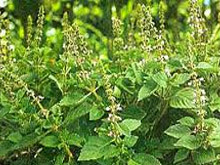Health Topics
-
Healthy Living
-
|
|
October 2009
|
| 12 Remedies with Tulsi |
| Mukesh Khosla |
| |
 |
Tulsi or basil has amazing therapeutic powers and has a cure for a number of ailments. It is a natural environment cleanser and a million of its saplings are being planted around the Taj Mahal. Tulsi is also a gourmet's delight as a flavourful ingredient in haute cuisine. |
Tulsi is a storehouse of flavonoids, which help protect cells and chromosomes from oxidation and damage. The generous amounts of the phytochemical compounds present in the plant possess powerful antioxidant and antiviral qualities. Another important compound present in it is called ursolic acid, which is an essential oil. All these compounds
work together to form a support to the body's natural immune system and guard against stress by balancing the mind, nerves and emotions. Tulsi cures a host of physical ailments, as it is an outstanding source of iron, calcium, potassium and Vitamin A and Vitamin C, which in particular is beneficial in curing cough and cold. It has a strong presence of magnesium that keeps arteries healthy, thereby improving blood flow and oxygen in the body. The potassium present in it keeps blood pressure in check which in turn ensures a healthy heart. Ongoing research is also discovering that tulsi may help insulin production in the body thus preventing the onslaught of diabetes by keeping the blood glucose in check. A member of a family of mint and oregano, the flavourful herbal leaves of tulsi have a number of applications in cookery as well. It is commonly used in the preparation of a concoction wherein tulsi and tea leaves are boiled for a refreshing beverage. The flavonoids in tulsi leaves are believed to reduce the risk of platelets forming clots on the arterial wall, preventing coronary heart disease and heart attacks. The herb also relieves stress and helps fight many debilitating diseases by neutralising free radicals that can otherwise damage tissues, cells and genes.
Tulsi finds a place of honour as basil in European and Thai haute cuisine. Because of its exotic aroma it perks up the salads and soups. It is also an important ingredient of pesto, an Italian sauce used as a base for many dishes. Pesto is used extensively in European dishes especially in pastas, as pizza toppings and as vinaigrette for salads.
Whether for perking up pastas and curries or for as a herb that provides miracle cures for an array of physical ailments or even as nature's own weapon against pollution, tulsi is a wonder herb that is a divine gift to humankind.
Headache
Make paste of tulsi leaves and sandalwood paste and apply on forehead before sleeping.
Cough
Prepare tea with one teaspoon of tulsi leaves per cup of water. Sweeten with 1 tsp honey.
Toothache
Make a powder of dried tulsi leaves and mix one tsp with one tsp of mustard oil and apply to painful tooth overnight.
Stress
Tulsi has strong anti-stress qualities. Chewing 10-12 leaves twice a day will help de-stress.
Diabetes
Make a powder of dried tulsi root and soak overnight. This helps keep body sugar levels in check.
Acne, blackheads and pimples
Mix finely ground tulsi leaves in 1 tsp lime juice and apply on affected areas twice a day.
Bad breath
Boil 1 tsp tulsi leaves and half tsp of powdered cinnamon in one cup of water. Use as a mouthwash.
Loss of taste
Rub a mixture of ground tulsi leaves and honey on the tongue for instant relief.
Glowing skin
Grind a handful of tulsi leaves with 1/2 tsp honey and apply on the face. Let it dry then rinse with water.
Sleeplessness
Boil Tulsi leaves in 1 cup of water for 5 minutes, strain and sweeten with honey. Take at bedtime.
Acidity
Chewing a few leaves after a meal. This not just works as an antacid as it helps the body absorb food but also prevents reflux and the formation of ulcers.
Heart attack
The flavonoids in tulsi leaves are believed to reduce the risk of platelets forming clots on the arterial wall, preventing coronary heart disease and heart attacks. |
|
| |
|